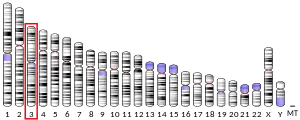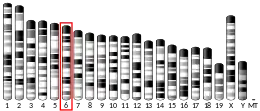ATP2B2
Plasma membrane calcium-transporting ATPase 2 is an enzyme that in humans is encoded by the ATP2B2 gene.[5][6]
The protein encoded by this gene belongs to the family of P-type primary ion transport ATPases characterized by the formation of an aspartyl phosphate intermediate during the reaction cycle. These enzymes remove bivalent calcium ions from eukaryotic cells against very large concentration gradients and play a critical role in intracellular calcium homeostasis. The mammalian plasma membrane calcium ATPase isoforms are encoded by at least four separate genes and the diversity of these enzymes is further increased by alternative splicing of transcripts. The expression of different isoforms and splice variants is regulated in a developmental, tissue- and cell type-specific manner, suggesting that these pumps are functionally adapted to the physiological needs of particular cells and tissues. This gene encodes the plasma membrane calcium ATPase isoform 2. Alternatively spliced transcript variants encoding different isoforms have been identified.[6]
References
- GRCh38: Ensembl release 89: ENSG00000157087 - Ensembl, May 2017
- GRCm38: Ensembl release 89: ENSMUSG00000030302 - Ensembl, May 2017
- "Human PubMed Reference:". National Center for Biotechnology Information, U.S. National Library of Medicine.
- "Mouse PubMed Reference:". National Center for Biotechnology Information, U.S. National Library of Medicine.
- Heim R, Hug M, Iwata T, Strehler EE, Carafoli E (May 1992). "Microdiversity of human-plasma-membrane calcium-pump isoform 2 generated by alternative RNA splicing in the N-terminal coding region". Eur J Biochem. 205 (1): 333–40. doi:10.1111/j.1432-1033.1992.tb16784.x. PMID 1313367.
- "Entrez Gene: ATP2B2 ATPase, Ca++ transporting, plasma membrane 2".
External links
- Human ATP2B2 genome location and ATP2B2 gene details page in the UCSC Genome Browser.
Further reading
- Møller JV, Juul B, le Maire M (1996). "Structural organization, ion transport, and energy transduction of P-type ATPases". Biochim. Biophys. Acta. 1286 (1): 1–51. doi:10.1016/0304-4157(95)00017-8. PMID 8634322.
- Strehler EE, Zacharias DA (2001). "Role of alternative splicing in generating isoform diversity among plasma membrane calcium pumps". Physiol. Rev. 81 (1): 21–50. doi:10.1152/physrev.2001.81.1.21. PMID 11152753. S2CID 9062253.
- Strehler EE, Treiman M (2004). "Calcium pumps of plasma membrane and cell interior". Curr. Mol. Med. 4 (3): 323–35. doi:10.2174/1566524043360735. PMID 15101689.
- Brandt P, Ibrahim E, Bruns GA, Neve RL (1992). "Determination of the nucleotide sequence and chromosomal localization of the ATP2B2 gene encoding human Ca(2+)-pumping ATPase isoform PMCA2". Genomics. 14 (2): 484–7. doi:10.1016/S0888-7543(05)80246-0. PMID 1427863.
- Wang KK, Wright LC, Machan CL, et al. (1991). "Protein kinase C phosphorylates the carboxyl terminus of the plasma membrane Ca(2+)-ATPase from human erythrocytes". J. Biol. Chem. 266 (14): 9078–85. doi:10.1016/S0021-9258(18)31554-0. PMID 1827443.
- Stauffer TP, Hilfiker H, Carafoli E, Strehler EE (1995). "Quantitative analysis of alternative splicing options of human plasma membrane calcium pump genes". J. Biol. Chem. 269 (50): 32022. doi:10.1016/S0021-9258(18)31797-6. PMID 7989379.
- Kuzmin I, Stackhouse T, Latif F, et al. (1994). "One-megabase yeast artificial chromosome and 400-kilobase cosmid-phage contigs containing the von Hippel-Lindau tumor suppressor and Ca(2+)-transporting adenosine triphosphatase isoform 2 genes". Cancer Res. 54 (9): 2486–91. PMID 8162598.
- Wang MG, Yi H, Hilfiker H, et al. (1994). "Localization of two genes encoding plasma membrane Ca2+ ATPases isoforms 2 (ATP2B2) and 3 (ATP2B3) to human chromosomes 3p26→p25 and Xq28, respectively". Cytogenet. Cell Genet. 67 (1): 41–5. doi:10.1159/000133794. PMID 8187550.
- Stauffer TP, Hilfiker H, Carafoli E, Strehler EE (1994). "Quantitative analysis of alternative splicing options of human plasma membrane calcium pump genes". J. Biol. Chem. 268 (34): 25993–6003. doi:10.1016/S0021-9258(19)74484-6. PMID 8245032.
- Latif F, Duh FM, Gnarra J, et al. (1993). "von Hippel-Lindau syndrome: cloning and identification of the plasma membrane Ca(++)-transporting ATPase isoform 2 gene that resides in the von Hippel-Lindau gene region". Cancer Res. 53 (4): 861–7. PMID 8428366.
- Kozel PJ, Friedman RA, Erway LC, et al. (1998). "Balance and hearing deficits in mice with a null mutation in the gene encoding plasma membrane Ca2+-ATPase isoform 2". J. Biol. Chem. 273 (30): 18693–6. doi:10.1074/jbc.273.30.18693. PMID 9668038.
- Street VA, McKee-Johnson JW, Fonseca RC, et al. (1998). "Mutations in a plasma membrane Ca2+-ATPase gene cause deafness in deafwaddler mice". Nat. Genet. 19 (4): 390–4. doi:10.1038/1284. PMID 9697703. S2CID 43382998.
- Usachev YM, Toutenhoofd SL, Goellner GM, et al. (2001). "Differentiation induces up-regulation of plasma membrane Ca(2+)-ATPase and concomitant increase in Ca(2+) efflux in human neuroblastoma cell line IMR-32". J. Neurochem. 76 (6): 1756–65. doi:10.1046/j.1471-4159.2001.00169.x. PMID 11259493. S2CID 5721693.
- DeMarco SJ, Strehler EE (2001). "Plasma membrane Ca2+-atpase isoforms 2b and 4b interact promiscuously and selectively with members of the membrane-associated guanylate kinase family of PDZ (PSD95/Dlg/ZO-1) domain-containing proteins". J. Biol. Chem. 276 (24): 21594–600. doi:10.1074/jbc.M101448200. PMID 11274188.
- DeMarco SJ, Chicka MC, Strehler EE (2002). "Plasma membrane Ca2+ ATPase isoform 2b interacts preferentially with Na+/H+ exchanger regulatory factor 2 in apical plasma membranes". J. Biol. Chem. 277 (12): 10506–11. doi:10.1074/jbc.M111616200. PMID 11786550.
- Wistow G, Bernstein SL, Wyatt MK, et al. (2002). "Expressed sequence tag analysis of human RPE/choroid for the NEIBank Project: over 6000 non-redundant transcripts, novel genes and splice variants". Mol. Vis. 8: 205–20. PMID 12107410.
- Strausberg RL, Feingold EA, Grouse LH, et al. (2003). "Generation and initial analysis of more than 15,000 full-length human and mouse cDNA sequences". Proc. Natl. Acad. Sci. U.S.A. 99 (26): 16899–903. Bibcode:2002PNAS...9916899M. doi:10.1073/pnas.242603899. PMC 139241. PMID 12477932.






